On Wednesday evening, 14 October 2020, the North South Line, East West Line and Circle Line were disrupted for over 3 hours due to a Power Fault, leaving many commuters stranded with unsafe crowd levels and few travel options.
Despite efforts to renew and upgrade equipment along the ageing North-South and East-West Lines in the past years, including Early Closures and Late Openings along the train lines, this major train disruption has once again shaken public confidence in the reliability of the MRT system.
The disruption is reminiscent of a similar incident in April 2016, where a power dip disrupted 4 train lines in the same area for almost 3 hours.
At around 7:05pm, commuters began experiencing delays on the North South & East West Line, posting updates on social media outlets. Initial photos showed multiple stations in complete darkness, indicating a power fault event. SMRT only reported this incident later at 7:16pm.
[NSL]: Due to a power fault, pls add 25mins train travel time btwn #Woodlands and #JurongEast. Free regular bus service is available between #Woodland and #Jurong East station.
— SMRT Corporation (@SMRT_Singapore) October 14, 2020
At around 7:55pm, commuters also reported delays along the Circle Line.
[CCL]: Due to power fault, there is no train service between #Serangoon and #Habourfront. Free regular bus services are available between #PayaLebar & #Harbourfront.
— SMRT Corporation (@SMRT_Singapore) October 14, 2020
SPRAWLING QUEUE LINES AT JURONG EAST, QUEENSTOWN AND WOODLANDS
Due to the large number of stations affected by the power fault, many commuters were left stranded. Free passing by bus services and bridging bus services were activated at affected stations, but were insufficient to cater to the large crowd. Safe distancing was not possible as buses filled to the brim.
At the worst affected station, Jurong East, long sprawling queues formed for the various shuttle buses across the temporary bus interchange. Crowds spilled onto the roads at the bus stop at Queenstown.
LACK OF DIRECTIONS, NO SHUTTLE BUSES SEEN AT CIRCLE LINE STATIONS
Commuters along the Circle Line found themselves stuck in unmoving trains at affected stations without assistance.
At 8:15pm, a packed train of commuters stalled at the Bishan Circle Line MRT Station platform. No announcements were heard to inform commuters of the train service disruption, and no staff were seen on the station platform.
At other Circle Line stations, commuters reported similar experiences.
There were also very few shuttle buses deployed to bridge train services on the Circle Line. Some commuters reported waiting over 30 minutes at affected stations without seeing a single shuttle bus.
Rail Bridging Services
Transport Minister Mr Ong Ye Kung shared in a Facebook post that around 115 Bridging Buses were activated on 14 Oct 2020 during the train disruptions.
Sectors operated by the various Public Transport Operators were:
- East West Line:
SBS Transit: Queenstown ↔ Boon Lay
Tower Transit: Buona Vista ↔ Tuas Link - North South Line:
SMRT Buses: Jurong East ↔ Woodlands - Circle Line:
SMRT Buses: Paya Lebar ↔ HarbourFront
The Yutong E12 bus made its debut on a Rail Bridging Service as well.
Response from Land Transport Authority
In an update posted on the Land Transport Authority Facebook page –
Preliminary investigations indicate that the incident was caused by a faulty power cable. LTA engineers are working with SMRT to carry out a full investigation into the incident.
https://www.facebook.com/WeKeepYourWorldMoving/posts/4528157237254477
| Timeline of Events – (Due to a Power Fault) |
||
| Time | Line Affected | Remarks |
| 1916 | North South Line | Additional 25 minutes travelling time – Woodlands ↔ Jurong East |
| 1917 | East West Line | Additional 25 minutes travelling time – Queenstown ↔ Gul Circle |
| 1923 | East West Line | Additional 25 minutes travelling time – Queenstown ↔ Tuas Link Free regular bus services activated – Queenstown ↔ Tuas Link |
| 1931 | East West Line | Train Service Disruption – Clementi ↔ Gul Circle |
| 1932 | North South Line | Train Service Disruption – Woodlands ↔ Jurong East |
| 1946 | East West Line | Free Bridging Bus activated – Queenstown ↔ Tuas Link |
| 1949 | North South Line | Train Service Disruption – Jurong East ↔ Marsiling Free Bridging Bus activated – Jurong East ↔ Woodlands |
| 2011 | East West Line | Train Service Disruption – Clementi ↔ Tuas Link |
| 2013 | Circle Line | Train Service Disruption – Serangoon ↔ HarbourFront Free regular bus services activated – Paya Lebar ↔ HarbourFront |
| 2021 | East West Line | Train Service Disruption – Dover ↔ Tuas Link |
| 2022 | Circle Line | Free Bridging Bus activated – Paya Lebar ↔ HarbourFront |
| 2027 | Circle Line | Train Service Disruption – Serangoon ↔ HarbourFront Additional 25 minutes travelling time – Dhoby Ghaut ↔ Serangoon |
| 2040 | Circle Line | Train Service progressively being restored Additional 25 minutes travelling time on the entire Circle Line |
| 2132 | Circle Line | Train Service Resumed Free regular & bridging bus service (Paya Lebar ↔ HarbourFront) ceased |
| 2239 | North South Line East West Line |
Train Service Resumed Free regular & bridging bus service still available |
Note: Event Timestamps are extracted from SMRT Corporation’s Twitter Feed.
Preliminary Findings
On 15 October 2020, SMRT released the preliminary findings into the Power Fault on 14 October 2020.
- A breakdown of insulation of a power cable between Tuas Link and Tuas West Road stations occurred.
- A circuit breaker at Tuas West Road station failed to kicked in to isolate the fault, resulting in the North-South-East-West-Line (NSEWL) power system to trip.
- To restore power to the NSEWL, there was an attempt to draw power from Buona Vista Intake substation (BVI).
- The attempt to draw power from BVI was done without first isolating the fault, resulting in a power supply disruption to CCL as BVI also serves CCL.
- The insulation fault has been identified and isolated and the faulty component of the circuit breaker has been replaced.
- SMRT is working with the Land Transport Authority to conduct a full investigation into the premature failure of these components, together with the original equipment manufacturers who supplied the parts.
Updated Findings
In an update press release published on 28 October 2020, LTA revealed that concurrent faults were to blame for the incident:
—
2 Investigations revealed that the incident was caused by the occurrence of concurrent faults. It started with a 22kV (kilovolt) power cable fault in the electrical zone between Tuas Link and Tuas West Road stations on the Tuas West Extension (TWE). This would not cause a disruption if the circuit breaker had kicked in and isolated the affected electrical zone, which would allow train services to continue uninterrupted. However, the circuit breaker at Tuas West Road station, where the section of faulty cables was, also malfunctioned.
3 It was discovered that the trip coil, which is a component in the circuit breaker, was faulty. As a result, the circuit breaker meant to isolate the 22kV cable fault within its electrical zone between Tuas Link and Tuas West Road stations did not automatically activate as designed. A secondary protection mechanism then kicked in and isolated a larger electrical sector as a precaution. This caused the power supply from Tuas Depot Intake (TDI) substation to be cut off, disrupting the power supply to the affected sector on the NSEWL.
4 The cable fault should have been first isolated within its electric zone before power is restored to the affected electrical sector, but this was not done. An attempt was then made to draw power from the Buona Vista Intake (BVI) substation, which also supplies power to the CCL. As the faulty cable at Tuas West Road station had yet to be isolated, this led to a voltage dip at BVI, which activated the safety mechanism that tripped to protect the CCL’s power system. This in turn affected train services along parts of the CCL.
5 After 40 minutes into the disruption, SMRT assessed that the power supply for the NSEWL and CCL could not be restored quickly. It proceeded to detrain commuters from 12 stalled trains along the NSEWL and three stalled trains along the CCL. All necessary safety precautions were taken. SMRT staff walked along the tracks to reach the stalled trains to check on the well-being of the commuters on board, and assisted and guided commuters to the nearest station. Detrainment on the three affected trains along the CCL was safely completed within 20 minutes.
6 At 8.00pm, SMRT managed to restore power to the affected sector on CCL by drawing power from Bishan Depot Intake. Train services on the CCL were progressively restored at about 8.43pm.
7 Once SMRT isolated the electrical zone with the section of faulty cables at Tuas West Road station, power was restored to the NSEWL. Detrainment operations for 11 out of 12 stalled trains on the NSEWL concluded at 8.42pm. Due to inclement weather and lightning risk, detrainment for the last NSEWL train near Bukit Batok station had to be suspended and was only completed at 9.43pm. With the detrainment operations completed, and following safety checks, train services were progressively restored on the NSEWL at 10.34pm.
Remedial Measures
8 Site investigations conducted during engineering hours on 15 October 2020 found that a section of 22kV cables located about 500m from TLK station was burnt through. The faulty trip coil and faulty cables have since been replaced.
9 As an additional precautionary measure, the maintenance team combed through all TWE stations to ensure all the circuit breakers’ trip coils are functional. Two other trip coils were found to exhibit inconsistent performance and were immediately replaced on 15 October 2020. The faulty trip coils have been sent for further forensic examination.
Pre-emptive Changeout
10 The TWE 22kV network configuration and protection systems are similar to Singapore Power’s network. Previous batches of 22kV cables of similar design and by the same manufacturer have been used in other parts of our MRT network. The TWE circuit breakers are of an established design and are widely used in the power industry.
11 In the case of TWE, since the line commenced commuter service in 2017, there had been four instances of faults at different locations in the upper layer of the power cables. These instances did not lead to any service disruption because the circuit breaker kicked in as intended and isolated the faults. LTA treated this as a matter of significant concern and raised the issue with the main contractor Alstom in January 2020. Alstom agreed to replace the upper of two layers of TWE power cables, which was where the faults had all occurred. Replacement works had been scheduled to commence in October 2020.
12 In light of the 14 October 2020 incident, Alstom will replace all the 22kV cables, amounting to 150km of cable. To provide additional assurance that power cable faults will not lead to another service disruption, Alstom will also replace all 113 trip coils along the TWE. LTA will implement weekend Early Closures from November 2020 to complete replacement of the trip coils by end 2020. As the replacement for the lower layer cables will take time to arrive, LTA will schedule Early Closures/Late Openings on weekends or Full Sunday Closures for limited periods in 2021 to facilitate the physical cable replacement works.
13 While the cables are being replaced, SMRT will increase the frequency of checks on the trip coils and 22kV breakers. This includes visual checks of the trip coil health status every 10 days, and mechanical testing every six months instead of 12 months. SMRT will also enhance their standard operating procedures for power recovery so that similar errors of judgement will not recur.
Working Together
14 Once again, we apologise for the inconvenience caused to commuters that evening. LTA, SMRT and Alstom will work together to address the underlying issues to minimise the risk of a reoccurrence.
—
In total, the incident lasted 216 minutes (3 hours 36 minutes) from 6.58pm to 10.34pm on NSEWL affecting about 110,000 commuters, and 69 minutes (1 hour 9 minutes) from 7.34pm to 8.43pm on CCL affecting about 13,000 commuters. Of these, about 6,500 commuters were on the stalled NSEWL trains and 275 of them on the CCL trains.
Rectification Work
In the wake of the rail disruption on 14 October 2020, power supply system supplier Alstom agreed to replace all 22kV power cables along the Tuas West Extension, amounting to around 150km of cable. These cables will have tougher insulation. In addition, all 113 trip coils along the TWE will be replaced, with all replacement costs to be bourne by Alstom.
The LTA had also decided to implement weekend Early Closures from November 2020 to complete replacement of the trip coils by end 2020. In addition, Early Closures/Late Openings on weekends or Full Sunday Closures for limited periods in 2021 may be implemented to facilitate the physical cable replacement works.
While cables are being replaced, SMRT would increase the frequency of checks on the trip coils and 22kV breakers. This included visual checks of the trip coil health status every 10 days, and mechanical testing every six months instead of 12 months. SMRT would also enhance their standard operating procedures for power recovery so that similar errors of judgement will not recur.
In-depth coverage of the disruption investigation can be found at the LTA press release.
External Links & References
- Report on Power Disruption along the North-South and East-West Lines and Circle Line – LTA [Accessed 30 Oct 2020]
- 3-line MRT fault: Alstom to replace 150km of power cables on Tuas West Extension; Oct 14 disruption affected 123,000 commuters – Straits Times [Accessed 30 Oct 2020]
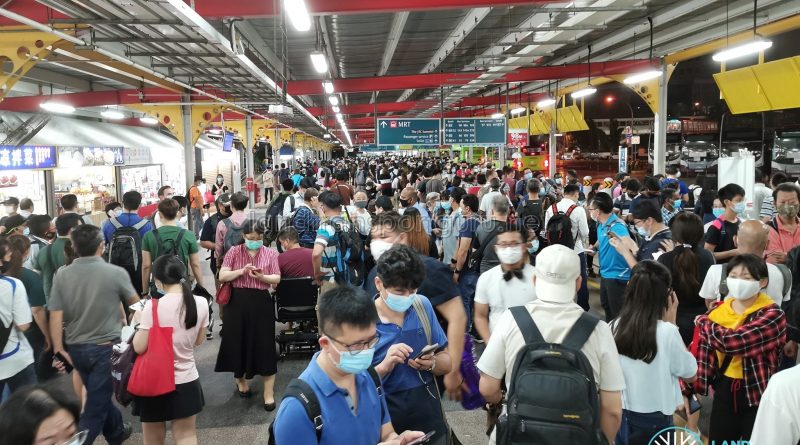
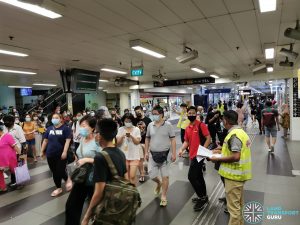
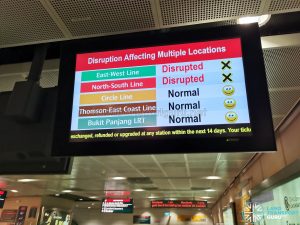
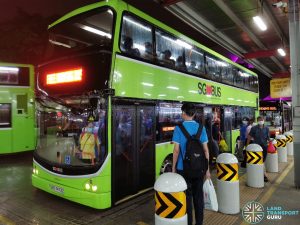
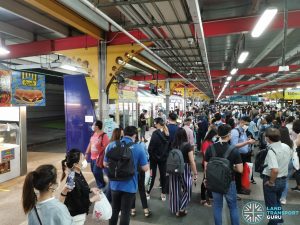
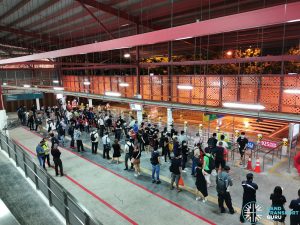
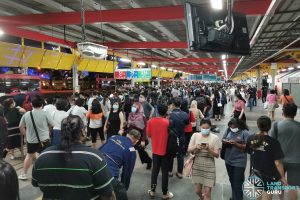
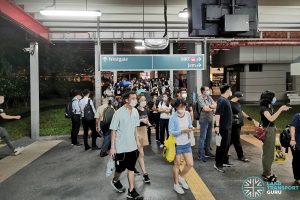
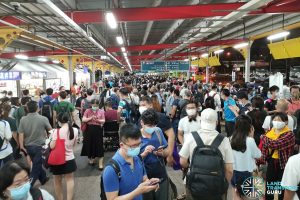
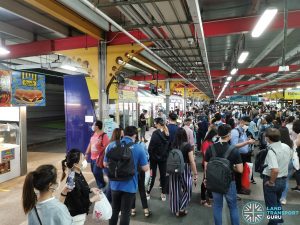
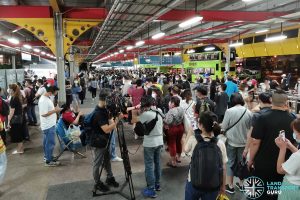
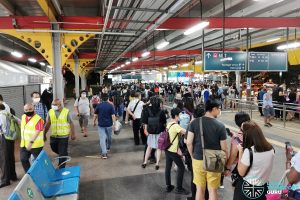
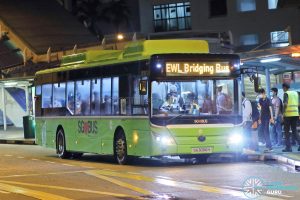
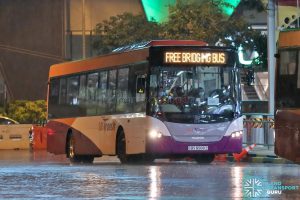
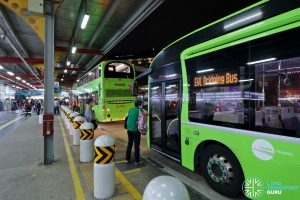
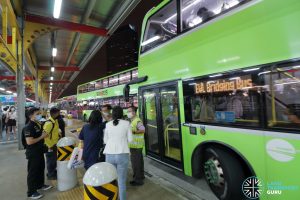
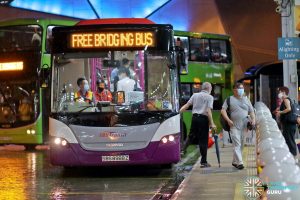
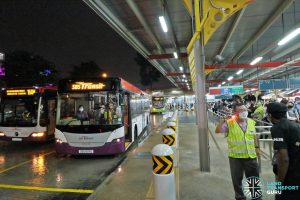
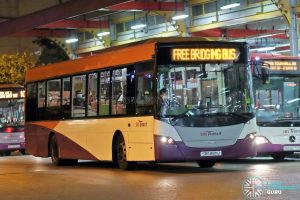
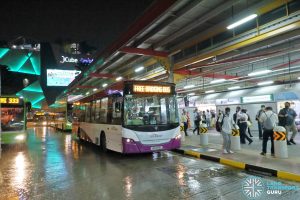
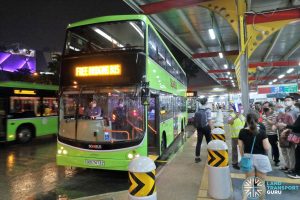
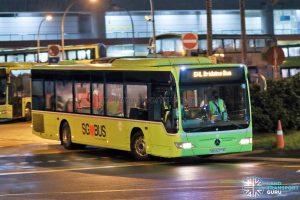
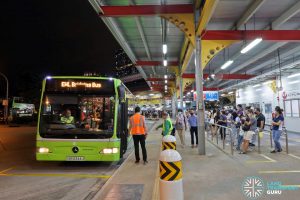
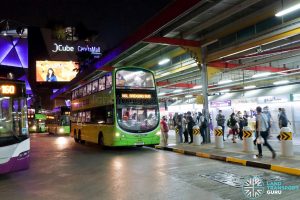
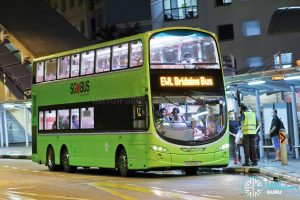
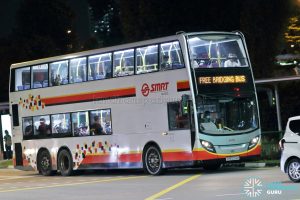
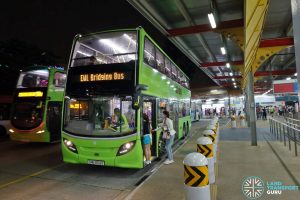
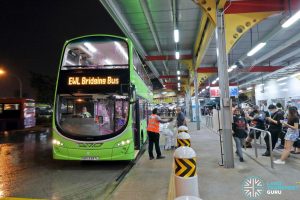
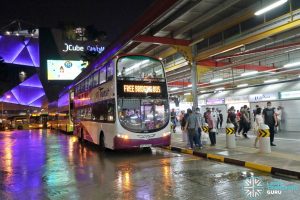
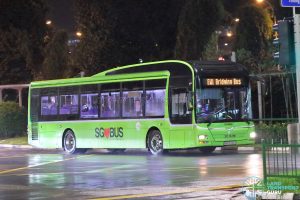
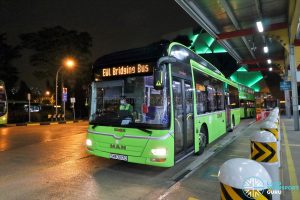
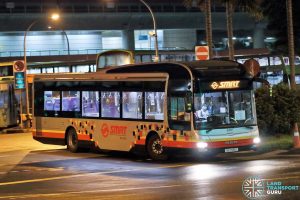
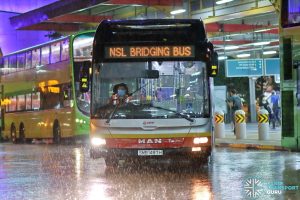
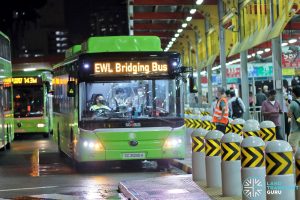
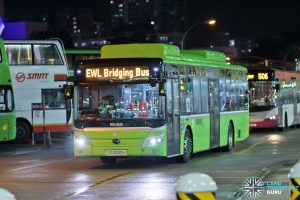
There used to be TF50 which most of the BCs knew the route in case of breakdown but again LTA decided to end their contract.
Atleast if lta shortened 171. They should have kept the old route as 171e. It would have still been not so bad.
Now if this happened to DTL. LTA will lose face for shortening 171 and taking out 700.
Is it possible to go more in depth into the bridging bus operations? Things have changed quite a lot already since the last time such an occurance has happened.
NSL and CCL bridging is operated by SMRT.
EWL bridging is operated by TTS, SBST and GAS based on the sector affected on the EWL. In this case, it is operated by TTS and SBST. However, TTS buses terminated at Buona Vista from Tuas Link while SBST buses terminated at Boon Lay from Queestown.
Maybe can cover on the express variants for NSL and EWL and why they did not operate it etc.
There you have it. A clear example of why bus services are still so very important even if it duplicates MRT lines.
Couldnt agree with you bro!But LTA scholars think otherwise..